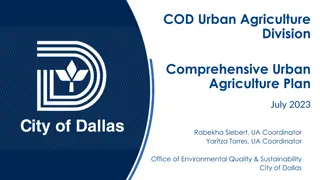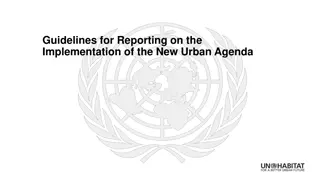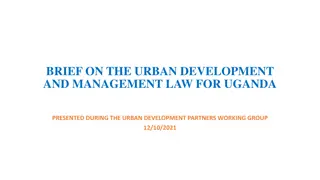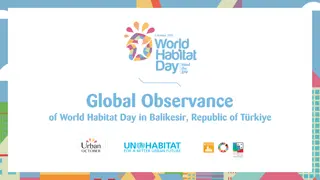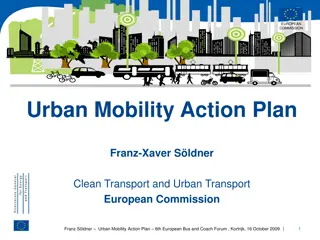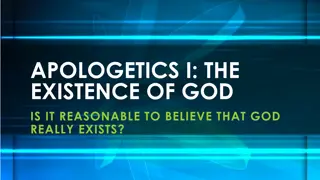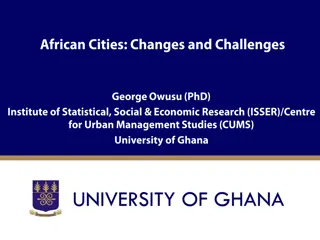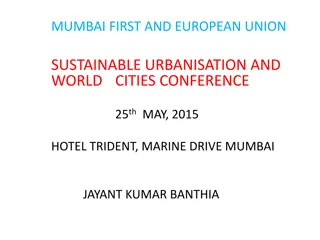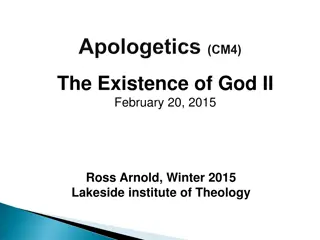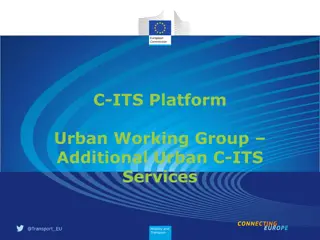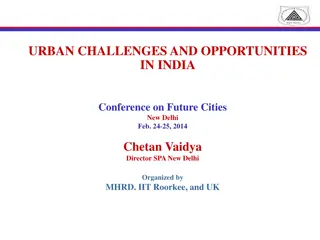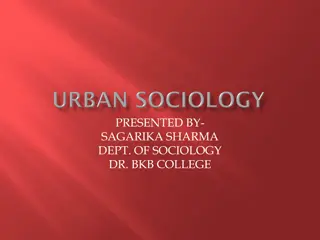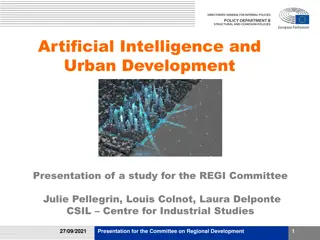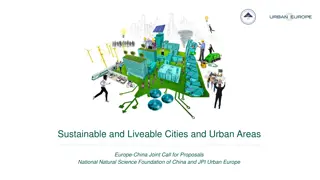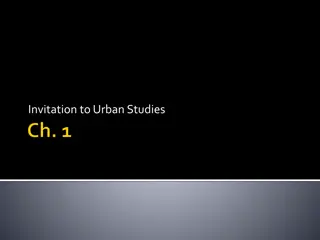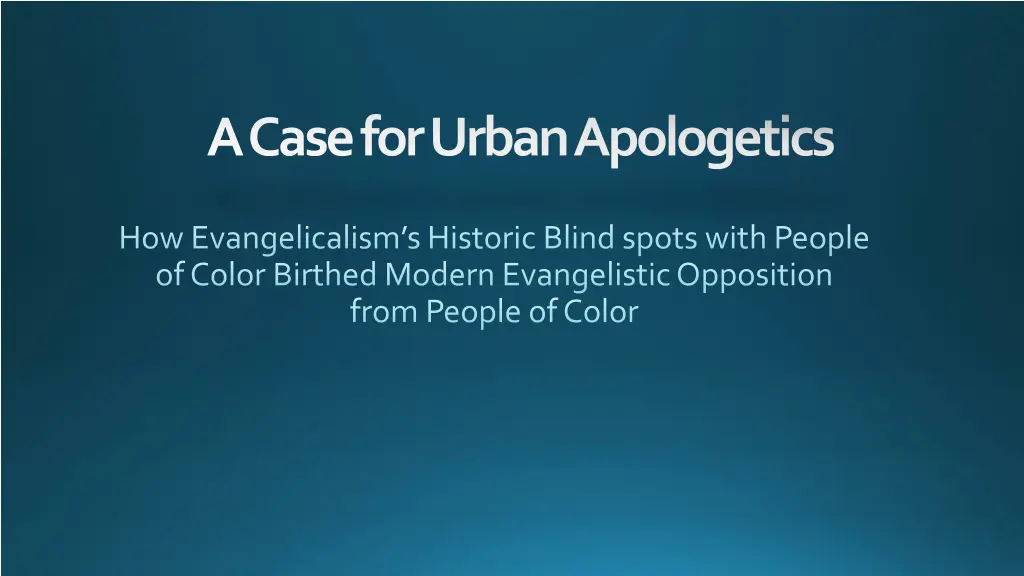
Urban Apologetics: Evangelicalism's Blind Spots with People of Color
In A Case for Urban Apologetics, explore how Evangelicalism's historic blind spots have led to modern evangelistic opposition from people of color, resulting in economic disparity, racism, and an exodus from the church. Discover the shifts in religious movements among Black and Latino communities in response to historical injustices.
Download Presentation

Please find below an Image/Link to download the presentation.
The content on the website is provided AS IS for your information and personal use only. It may not be sold, licensed, or shared on other websites without obtaining consent from the author. If you encounter any issues during the download, it is possible that the publisher has removed the file from their server.
You are allowed to download the files provided on this website for personal or commercial use, subject to the condition that they are used lawfully. All files are the property of their respective owners.
The content on the website is provided AS IS for your information and personal use only. It may not be sold, licensed, or shared on other websites without obtaining consent from the author.
E N D
Presentation Transcript
ACase for Urban Apologetics How Evangelicalism s Historic Blind spots with People of Color Birthed Modern Evangelistic Opposition from People of Color
Economic Disparity Racism Urbanization Exodus out of Church
Evangelicalisms Historic Blind Spots 20thCentury 1st Old Lights 2nd Anti- Slavery Higher Criticism MLK Great Evangelical Disaster Great Reversal White Evangelicalism Great Civil Awakenings Rights/Present
The World of People of Color Reconstruction 70 s - Present Imago Dei stripped Egypt = USA 1910-1070 Civil Rights Industrialized Cities Cut short Manifest Destiny Deindustrialization Hip Hop War on Drugs Revival of Great Migration Movements Great Migration Slavery
Movements Birthed Moorish Science Temple The AusarAusetSociety Nation of God s and Earths Black Hebrew Israelites The Nation of Islam
Modern Era American history reveals during times of economic disparity, racism, and urbanization church going Blacks (and recently Latinos) have turned away from their current religious establishments to find answers to their life situational questions. The Atlanta Blackstar reported one reason Black Millennials are leaving the Church was due to the discovery of Christianity being used to enslave and oppress their ancestors. The Atlanta Blackstar, 6 Reasons Young Black People are Leaving The Church , http://atlantablackstar.com/2014/01/24/6- reasons-young-black-people-are-leaving-the-church/4/, accessed on February 20, 2016. Over 200,000 Latinos in America exchanged their Christian identity for one that s Islamic. Cited reasons for their exodus were; not understanding the Trinity, historic facts showing Christianity was forced on their ancestors during colonization, and their ethnic roots tracing back to the Moors in Spain, who were themselves Muslim. The Atlanta Blackstar, 6 Reasons Young Black People are Leaving The Church , http://atlantablackstar.com/2014/01/24/6- reasons-young-black-people-are-leaving-the-church/4/, accessed on February 20, 2016. Latin Times, Why Are Latinos Leaving Catholicism? New Study Provides Answers on Hispanics Religious Beliefs Changing , by SusmitaBaral, November 13, 2014, http://www.latintimes.com/why-are-latinos-leaving-catholicism-new-study-provides- answers-hispanics-religious-275604, accessed on January 20, 2016. Washington Report on Middle Eastern Affairs, Latino Muslims a Growing Presence in America , by Lisa Viscidi, http://www.wrmea.org/2003-june/latino-muslims-a-growing-presence-in-america.html, accessed on January 12, 2016.
White Evangelicalism White Evangelicalism is the American-created sub-set of Christianity that caters to the profile of Anglo middle-class nuclear family, with preferential treatment towards Anglo males, all the while calling believers who are not of this profile to culturally assimilate before becoming accepted.
Future Considerations Develop a missiological method that assesses urban missional context Scripture our rule of faith and practice Reason-A missiological method takes into consideration the thought process of the unbeliever in order to bring their content into dialogue with Scripture. Culture-For Vanhoozer, culture itself is a text that requires interpretation. When the culture encounters missionaries proclaiming God s metanarrative, it should cause them to ask questions the missionary is prepared to answer in meekness (1 Peter 3:15). Ibid., 316. Experience-Everyday experiences in life happen so they cannot be avoided however, they must be brought into submission to Scripture (cf. 2 Pet 1:16-21). Filter philosophies, ideologies through the method and develop a missiological response
Church Planting Considerations FAMILY Our homes are the first place of ministry and will mirror Ephesians 5:22- 6:4which then will lead our entire fellowship to practice familial interdependence. AUTHORITY (SCRIPTURE & GOVERNMENT) Our rule of faith & practice the Bible, commands we pray and respect our national, state and local leaders (1 Timothy 2:1-6). BUSINESS Our money will be stewarded for God s glory as it s shared with those in need (Philippians 4:10-20) as we teach them principles of biblical stewardship. RELIGION Our hearts will be filled compassion (Matthew9:35-38) when we give reasonable responses for the hope we have in Christ (1 Peter 3:13-17) when our evangelistic efforts are opposed. INSTITUTIONS OF LEARNING & REHABILITATION Our time will be spent volunteering/working educational and correctional systems in order to see the gospel reach the lost (Romans 10:9-17). CULTURE (ARTS & ENTERTAINMENT) Our focus will be to assess the culture s beliefs, language, and practices and filter them through Scripture before identifying ways toengage with the lost in our city (Acts 17:16-34&1 Thessalonians 2:8).

